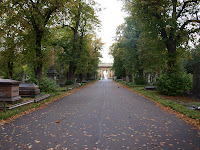 Yesterday I attended another of Cathie Bryan's wonderful walking tours of the Egyptianising monuments of London, this time the Petrie Museum's 'Egypt Undead' tour of Brompton Cemetery in South-West London. This cemetery covers 16.5 hectares and is described as 'one of the finest cemeteries in the country', containing a number of monuments of great historical interest including that of Emmeline Pankhurst, leader of the British Suffragette Movement.
Yesterday I attended another of Cathie Bryan's wonderful walking tours of the Egyptianising monuments of London, this time the Petrie Museum's 'Egypt Undead' tour of Brompton Cemetery in South-West London. This cemetery covers 16.5 hectares and is described as 'one of the finest cemeteries in the country', containing a number of monuments of great historical interest including that of Emmeline Pankhurst, leader of the British Suffragette Movement.
As this tour was organised by the Petrie Museum, the main focus was on the Egyptianising and Egyptology-related monuments in the cemetery. It is clear that particular features were used for Egyptianising burials in London during the period 1700-1900 which appear time and time again, including the obelisk and the temple pylon (see also Kensal Green and Abney Park cemeteries). We also saw these motifs at Brompton, though some have unusual details:
 |
| Obelisk memorial with Japanese characters of Jugoi Nagayori Asano (1865-1886) |
One monument with an unusual history is that of Hannah Courtoy, an illustrious individual who possessed a huge fortune. This structure is shaped like an Egyptian temple-pylon and apparently no documentation of the construction of the monument within the cemetery survives. This somehow led to a belief that Courtoy's monument was proof that the Egyptians had invented time-travel!
 |
| Magnificent Egyptian temple pylon-style monument of Hannah Courtoy (1784-1849) |
 |
| Temple pylon-style monument of Charles Thompson, built in 1881 |
|
|
 |
| Another pylon-style monument of Augustus Horsfall Bill, built in 1874 |
|
|
|
|
Most interesting of all was the grave of Joseph Bonomi and his family. Bonomi was an artist, sculptor and Egyptologist who famously worked in Egypt with Robert Hay in 1824. He was the Egyptologist curator of the Sir John Soane Museum, London, and also worked at the British Museum most famously on Hay's Egyptian temple casts. Sadly Bonomi lost four children in one week due to whooping cough, and his wife soon afterwards. Their family monument was engraved with Anubis, Egyptian god of the afterlife.
 |
| Joseph Bonomi's family monument |
 |
| Detail of Bonomi's grave |
The Brompton walk was a great way to spend an crisp Autumn afternoon in London and once again the group were kindly treated to tea and delicious biscuits by the Friends of Brompton Cemetery. My heartfelt thanks go to Cathie Bryan for her kindness in arranging for me to attend the tour.
 Yesterday I attended another of Cathie Bryan's wonderful walking tours of the Egyptianising monuments of London, this time the Petrie Museum's 'Egypt Undead' tour of Brompton Cemetery in South-West London. This cemetery covers 16.5 hectares and is described as 'one of the finest cemeteries in the country', containing a number of monuments of great historical interest including that of Emmeline Pankhurst, leader of the British Suffragette Movement.
Yesterday I attended another of Cathie Bryan's wonderful walking tours of the Egyptianising monuments of London, this time the Petrie Museum's 'Egypt Undead' tour of Brompton Cemetery in South-West London. This cemetery covers 16.5 hectares and is described as 'one of the finest cemeteries in the country', containing a number of monuments of great historical interest including that of Emmeline Pankhurst, leader of the British Suffragette Movement. 




